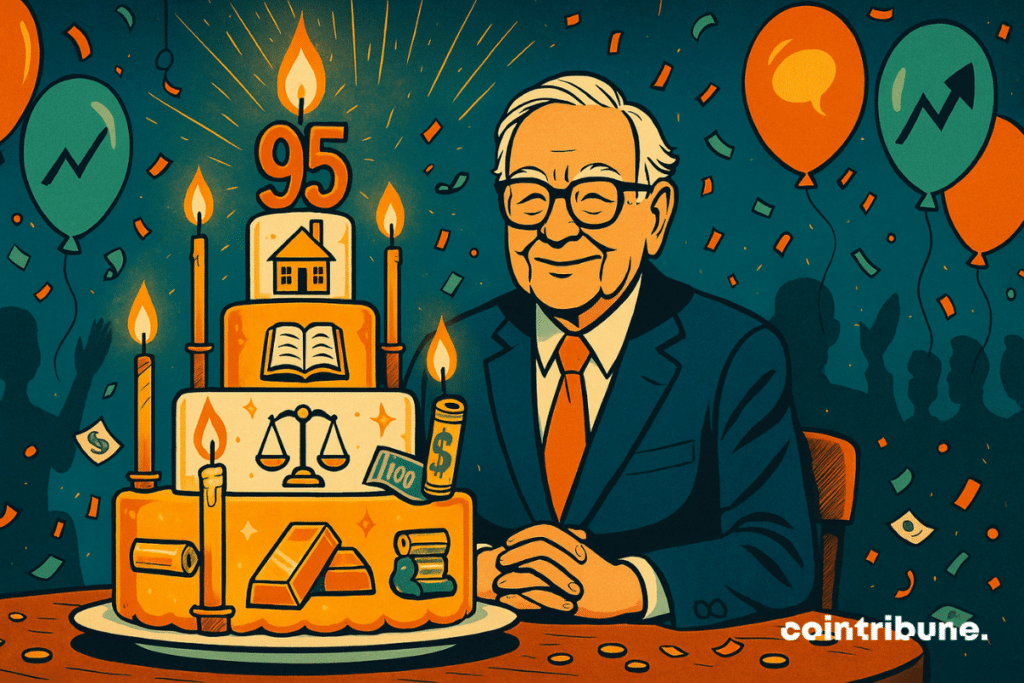Warren Buffett To Step Down As Berkshire CEO At 95
At 95 years old, Warren Buffett remains one of the last bastions of capitalism based on patience and value. While markets ignite to the rhythm of algorithms and viral tweets, the Oracle of Omaha remains faithful to an immutable strategy : investing in what one understands, for the long term. Besides his birthday, this week also marks a turning page for Berkshire Hathaway.

In Brief
- Warren Buffett celebrates his 95 years, embodying a rare longevity both human and financial.
- He remains faithful to a patient investment strategy, focused on the intrinsic value of companies.
- Buffett does not hide his skepticism towards cryptos and new forms of digital speculation.
- Yet, his method continues to inspire, including among young investors seeking guidance.
Warren Buffett at 95 years : a new chapter begins at the head of Berkshire Hathaway
Warren Buffett has officially announced that he will step down from his position as CEO of Berkshire Hathaway by the end of the year, after more than sixty years of uninterrupted leadership. An unprecedented longevity in the history of modern capitalism, which gives this transition considerable symbolic significance.
Since he took control of Berkshire Hathaway in 1965, the Oracle of Omaha has turned this former textile company into a leading conglomerate, whose market capitalization today exceeds 870 billion dollars. The announcement of his departure, though predictable, marks the end of an era, both for Berkshire and for the financial markets as a whole.
For several years, Buffett had prepared his succession, with Greg Abel, currently in charge of non-insurance operations, designated as the natural successor. However, the issue goes beyond the simple handover. It is Buffett’s very imprint that is in question, as he built his reputation on careful, countercyclical management focused on creating value over several decades. The following elements summarize what makes this transition so notable :
- 60 years of uninterrupted governance, a record among major American capitalizations ;
- An investment strategy based on buying strong companies, at reasonable prices, and holding them long term ;
- A decentralized management of Berkshire Hathaway, relying on the autonomy of subsidiaries ;
- Exceptional historical performance: between 1965 and 2023, Berkshire stock generated an average annual return of +19.8 %, compared to +9.9 % for the S&P 500 over the same period ;
- A public image of rigor, integrity and financial education, embodied in his annual letters read by millions of investors worldwide.
This governance change, though controlled, ends the era of a man who embodied investment based on common sense and resilience. For the markets, it also brings new uncertainty, because while the mechanisms are in place, Buffett’s strategic intuition and moral stature are not transferable.
An investment philosophy still as relevant as ever
Beyond his announced departure, Warren Buffett took this symbolic milestone as an opportunity to recall the foundations of his investment strategy, based on simplicity and intellectual rigor.
One of his major principles remains the refusal to attempt to anticipate the market and to engage in irrational speculation.
David I. Kass, professor at the Robert H. Smith School of Business, points out that “Buffett said that what distinguishes successful investors from others is the ability not to panic when markets fall, nor to become euphoric when they rise sharply”. A principle he put into practice, notably during the 2008 crisis, when he intervened as lender of last resort for Goldman Sachs or General Electric.
Buffett’s philosophy has never been summed up by a list of financial ratios. It is based on a deep understanding of companies, their leadership and their ability to generate value over the long term.
His investment in Apple in 2016, against the advice of many analysts who considered him too distant from tech, turned out to be one of the most profitable of his career. “With Apple, Buffett made the biggest gain of his entire career on a single stock, with about 100 billion dollars in return on investment, and it’s not over yet”, recalls Ardal Loh-Gronager. It is this ability to evolve, without renouncing his convictions, that explains the ongoing relevance of his choices, even in the digital age.
At a time when artificial intelligence, cryptos and ETFs are reshaping the contours of investment, Buffett’s approach, focused on intrinsic value, patience and emotional control, remains a reliable compass.
The announced transition at the head of Berkshire will probably not change the company’s deeply rooted culture. However, it opens the way to a period of observation: how will this giant behave without its emblematic founder? For traditional investors as well as for actors of the Web3, understanding Buffett does not mean blindly adhering to his choices, it means integrating a rigorous methodology that transcends bubbles and cycles.
Maximize your Cointribune experience with our "Read to Earn" program! For every article you read, earn points and access exclusive rewards. Sign up now and start earning benefits.
Diplômé de Sciences Po Toulouse et titulaire d'une certification consultant blockchain délivrée par Alyra, j'ai rejoint l'aventure Cointribune en 2019. Convaincu du potentiel de la blockchain pour transformer de nombreux secteurs de l'économie, j'ai pris l'engagement de sensibiliser et d'informer le grand public sur cet écosystème en constante évolution. Mon objectif est de permettre à chacun de mieux comprendre la blockchain et de saisir les opportunités qu'elle offre. Je m'efforce chaque jour de fournir une analyse objective de l'actualité, de décrypter les tendances du marché, de relayer les dernières innovations technologiques et de mettre en perspective les enjeux économiques et sociétaux de cette révolution en marche.
The views, thoughts, and opinions expressed in this article belong solely to the author, and should not be taken as investment advice. Do your own research before taking any investment decisions.